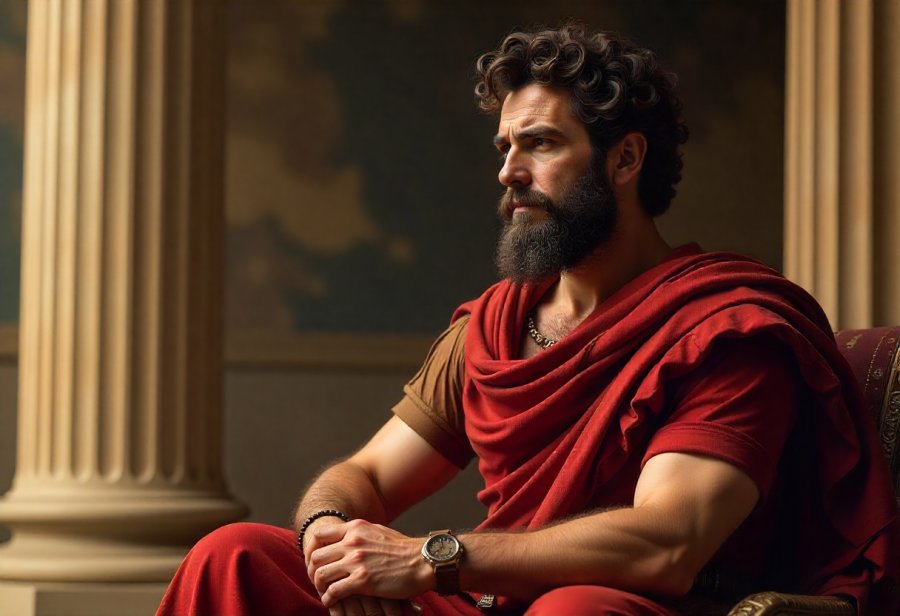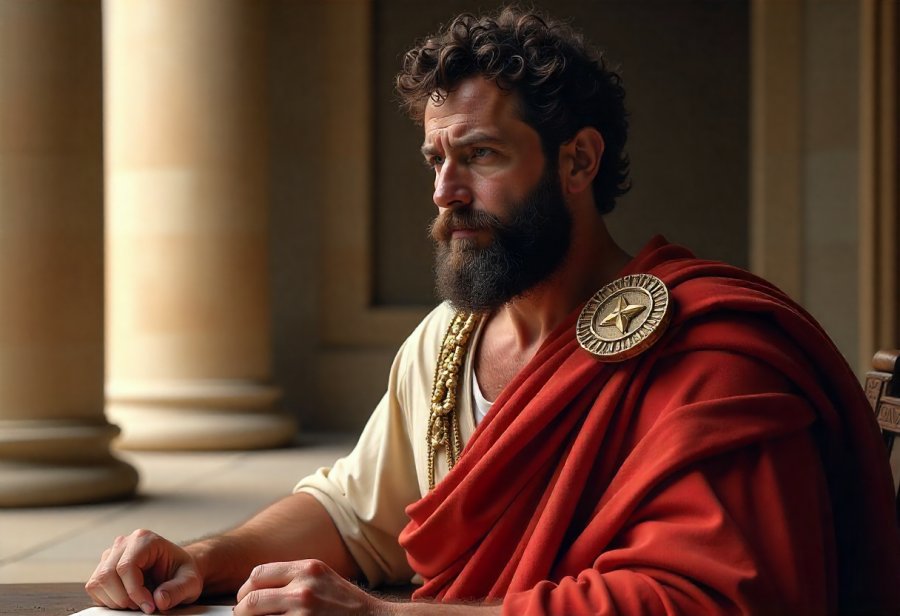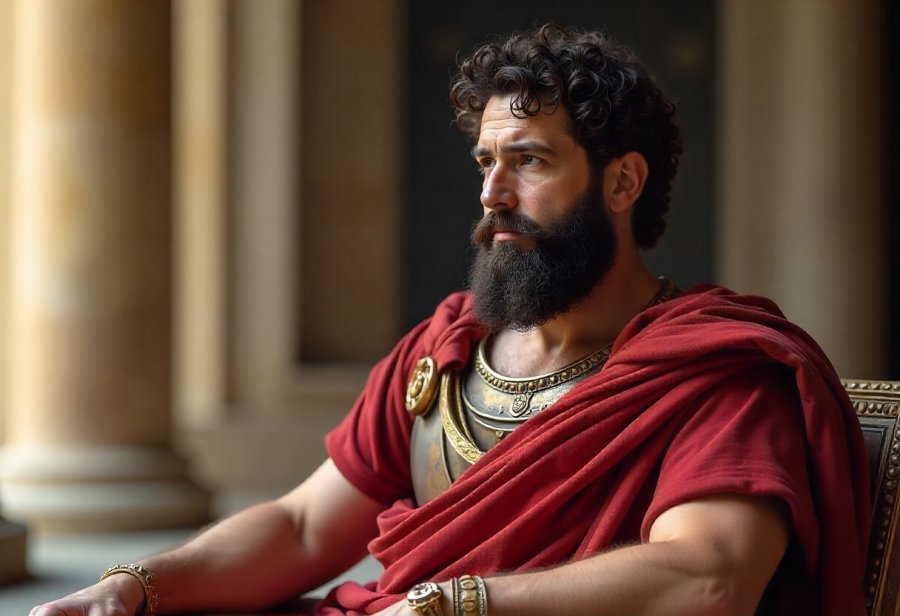Could true strength lie not in external victories but within the discipline of the mind and soul? The life of Marcus Aurelius exemplifies this profound truth: as a Roman emperor and Stoic philosopher, he demonstrated that authentic power stems from self-control, resilience, and moral clarity amid chaos. His routines of journaling, reflection, and virtue fostered inner resilience, enabling him to lead with dignity through wars, plagues, and political upheaval. Today’s fast-paced world often equates strength with visible achievements, yet Marcus’s legacy challenges us to reconsider—does mastery over ourselves surpass conquest? As society shifts toward valuing inner virtues like patience, humility, and emotional intelligence, embracing inner discipline promises a more authentic, lasting influence. This exploration invites readers to view inner resilience as the ultimate empire, capable of transforming personal lives and leadership in an uncertain future.

Inner Discipline: The True Power Beyond External Conquest
When we think about strength, images of muscles, armies, or visible achievements often come to mind. We tend to believe that power is measured by outward displays—conquering lands, accumulating wealth, or showcasing dominance. But beneath these surface signs lies a deeper form of strength: one rooted in discipline, wisdom, and resilience that exists inside us. This raises a compelling question: could true power be less about external victories and more about mastering ourselves?
Throughout history, notable figures like Marcus Aurelius challenge this idea. As both Roman emperor and philosopher, he exemplified a type of strength that isn’t easily seen but is profoundly felt. His life shows that genuine power stems from controlling impulses, maintaining focus amid chaos, and cultivating inner calm—traits that form an unshakeable mental fortress. Inner discipline, in this sense, isn’t about suppressing emotions, but about guiding them with reason and virtue.
Marcus’s story underscores how this internal strength can be more impactful than external conquest. Facing wars, plagues, and political upheaval, he turned to Stoic philosophy to anchor himself. His daily routines—journaling, reflection, and moral contemplation—helped him develop resilience and clarity. These practices fostered a sense of self-awareness that enabled him to respond to crises with patience and moral integrity, rather than reactive force.
This inner resilience isn’t just about enduring hardship; it’s about actively shaping our responses and character. Leaders and individuals who cultivate mental fortitude resist distractions, manage their emotions, and stay aligned with their values even in turbulent times. Marcus’s example teaches us that mastery over oneself creates a foundation of strength that lasts beyond fleeting external victories.
In a world increasingly focused on external validation, embracing inner discipline offers a different path—one of lasting influence and authentic power. It’s a reminder that real strength begins with self-control, wisdom, and resilience. These qualities, cultivated daily through reflection and mindful effort, become the true measure of a leader’s, and a person’s, enduring influence. Inner discipline, therefore, might just be the greatest empire we can build.
Marcus Aurelius’s Journey: Balancing Power, Philosophy, and Inner Strength
Marcus Aurelius’s rise to power was shaped by a blend of inheritance, merit, and a sincere commitment to philosophy. Born into a prominent Roman family in 121 AD, he was destined for leadership, receiving an education that emphasized rhetoric, literature, and especially Stoic principles. These teachings weren’t just academic; they laid the foundation for the inner discipline that would define his reign. When he ascended to emperor in 161 AD, he inherited an empire beset by external threats and internal unrest, yet he approached these challenges with a calm, deliberate mindset rooted in virtue.
His leadership was marked by a careful balance between military action and deep reflection. Facing wars along northern borders, Marcus demonstrated restraint and purpose, viewing military campaigns as necessary duties rather than opportunities for conquest. Behind the scenes, he often turned inward, reflecting on the importance of wisdom and humility. His Stoic training guided him to govern with moral clarity, emphasizing self-control over ego-driven decisions. This internal focus helped him maintain stability, even when external circumstances seemed volatile.
Throughout his reign, Marcus’s military efforts were driven by a sense of duty rather than ambition. While he commanded armies and defended the empire’s borders, he did so with a focus on moral integrity. His resilience was tested during the outbreak of the Antonine Plague, a devastating crisis that struck the empire. Instead of succumbing to despair, he applied Stoic principles—accepting what he could not change and acting with compassion—showing that his strength lay in inner resilience, not external dominance.
Marcus’s governance was characterized by a commitment to virtue and self-mastery. His routines of journaling and reflection helped him stay aligned with his philosophical ideals, fostering a calm and focused mind. These practices weren’t just personal habits—they became vital tools for managing the chaos of empire. His ability to remain centered amid crises reinforced the idea that true strength comes from within, and that leadership rooted in inner discipline can weather any storm.
His reign exemplifies the harmony between external conquest and internal mastery. While he defended Rome’s borders and maintained order, his true power was rooted in his moral resolve and self-control. This inner discipline enabled him to lead with dignity, inspiring loyalty and trust. Marcus Aurelius proved that lasting influence stems from governing oneself first—an insight that elevates his legacy beyond military victories to a timeless example of true strength.

Inner Resilience: The Core of Authentic Leadership and Growth
Inner discipline is the foundation of genuine strength, especially when it comes to leadership and personal growth. Developing mental resilience allows us to stay calm and clear-headed even in the most stressful situations. This calmness creates space for thoughtful decisions instead of impulsive reactions driven by emotion or ego. Marcus Aurelius exemplified this through daily routines like journaling, which helped him reflect on his actions and stay aligned with Stoic principles. These habits foster self-awareness and reinforce the inner resilience needed to navigate chaos with grace.
This resilience isn’t merely about enduring hardships; it’s about actively cultivating a steady mind capable of facing any challenge. Inner discipline helps leaders and individuals resist distractions and temptations, maintaining focus on long-term goals and core values. It’s not about suppressing emotions but managing them wisely, allowing reason to guide actions rather than fleeting impulses. This mental fortitude creates a core that withstands external pressures and internal doubts alike, making it the true source of authentic strength.
Marcus’s journaling, a simple yet powerful habit, illustrates this clearly. By writing down his thoughts and reflections, he clarified his values and recognized recurring patterns of distraction or weakness. This process helped him realign his actions with his principles and stay committed to virtue. Regular meditation and quiet reflection further strengthened his capacity for self-control. These routines weren’t just personal habits—they became essential tools for developing resilience, enabling him to face external chaos with calmness and clarity.
Wise leadership depends on this inner wisdom. Marcus made decisions rooted in reason and moral clarity, rather than reacting impulsively to political or military pressures. His ability to assess situations calmly and act with virtue inspired trust and loyalty. When leaders operate from a place of inner discipline, they foster stability that encourages others to follow with confidence. Wisdom elevates external authority into a lasting influence rooted in moral integrity, demonstrating that true strength derives from within.
Building mental resilience involves adopting daily practices that reinforce self-control and emotional stability. Techniques such as mindful reflection, journaling, and deliberate patience help identify impulses and emotional reactions, enabling better self-regulation. Facing setbacks with patience and acceptance deepens this resilience over time. These habits become second nature, creating a steady, reliable mind—ready to remain composed and effective, no matter what external circumstances arise. Inner discipline, cultivated consistently, becomes the bedrock of authentic leadership and personal growth.
Modern Wisdom: Applying Ancient Principles to Today’s Leaders and Individuals
In today’s fast-paced world, the lessons of inner discipline and wisdom are more relevant than ever. Leaders across business, politics, and community sectors who prioritize self-awareness and moral integrity tend to build stronger trust and loyalty. For example, CEOs practicing mindfulness and emotional regulation often handle crises more effectively, creating healthier workplaces and fostering a culture of stability. These qualities enable them to remain calm under pressure, make deliberate decisions, and inspire confidence among their teams.
Many contemporary figures exemplify this approach. Satya Nadella, CEO of Microsoft, emphasizes empathy and self-awareness as essential leadership traits. His focus on emotional intelligence transformed Microsoft’s corporate culture, demonstrating that inner resilience can drive external success. Similarly, Malala Yousafzai’s unwavering resolve in the face of adversity shows how inner discipline—centered on moral strength—can inspire global change. On an individual level, countless people employ practices like journaling, meditation, or breath control to manage stress and stay grounded amid chaos, proving that inner resilience is accessible and practical.
When leaders and individuals shift their focus from external validation and conquest to cultivating inner discipline, their influence becomes more sustainable and authentic. Instead of chasing fleeting victories or material gains, they find deeper fulfillment and resilience. Such leaders inspire loyalty through integrity and transparency, creating a ripple effect that benefits organizations and communities alike. Personal stories highlight how daily habits—mindfulness, reflection, patience—build mental fortitude, enabling better decision-making and emotional stability over time.
Building inner discipline can start with simple, consistent routines. Daily meditation, journaling, or setting small, achievable goals reinforce self-awareness and emotional resilience. Resisting impulsive reactions and practicing patience in difficult moments gradually strengthen mental fortitude. Over time, these habits become second nature, helping you remain steady and effective regardless of external circumstances. This steady foundation supports both personal growth and effective leadership rooted in virtue.
Leading with inner discipline and moral clarity also shapes organizational culture. Leaders who reflect regularly on their values and remain humble amid criticism foster trust and loyalty. They listen actively and show genuine empathy, creating an environment where others feel safe and motivated to develop their own virtues. Actions rooted in inner discipline aren’t just about personal integrity—they set a standard that encourages others to follow, resulting in a more authentic, resilient collective strength.
As society continues to evolve, the emphasis on inner resilience and moral clarity will only grow. Leadership models are shifting away from superficial displays of power toward qualities like patience, humility, and emotional intelligence. Programs that incorporate mindfulness, reflection, and virtue-building are becoming more common, signaling a broader cultural shift. The most enduring leaders of the future will be those who recognize that true influence stems from within, making inner discipline the ultimate measure of strength in an increasingly complex world.

The Future of Strength: Embracing Inner Power in a Changing World
As we look to the future, it’s clear that our understanding of strength and leadership is shifting toward valuing inner discipline more than ever. The traditional image of power—dominated by external victories, material success, and outward displays of control—is gradually giving way to a deeper appreciation for qualities like resilience, moral clarity, and self-mastery. Tomorrow’s leaders are likely to prioritize cultivating these inner virtues, recognizing that true influence stems not from superficial dominance but from a well-developed inner core.
This evolving perspective is reflected in new leadership models that emphasize emotional intelligence, mental fortitude, and ethical integrity. Programs focused on mindfulness, reflection, and virtue-based training are becoming more widespread, aiming to develop inner resilience as a foundational skill. As society faces increasing complexity—climate challenges, social upheaval, rapid technological change—the ability to remain calm under pressure, act with moral clarity, and adapt with humility will be seen as the true marks of genuine strength. These qualities echo the timeless lessons of Marcus Aurelius and Stoic philosophy, proving their relevance in an ever-changing world.
Beyond leadership, this shift influences how we define personal success. Moving away from external validation, more individuals are embracing practices like journaling, meditation, and mindful reflection to build inner resilience. These habits help manage stress, foster emotional stability, and reinforce long-term values amid chaos. As these routines become ingrained, they create a steady foundation—one that empowers people to face uncertainty with confidence and clarity. The emphasis on inner discipline as a core life skill promises a cultural transformation where character and moral strength are valued above fleeting achievements.
Looking further ahead, this focus on inner power could reshape entire communities and organizations. Success may come to be measured by qualities such as patience, humility, and moral courage rather than wealth or status. Leaders who govern themselves first, demonstrating authenticity and moral resolve, will inspire trust and loyalty in ways that superficial displays cannot match. In this future, genuine influence will be rooted in self-mastery and inner resilience, creating a more stable, ethical, and compassionate social fabric.
Ultimately, cultivating inner discipline will be essential for navigating a world of increasing complexity and uncertainty. Those who develop mental resilience, moral clarity, and self-awareness now will be best equipped to meet the challenges of tomorrow. As inner strength becomes recognized as the greatest form of power, the legacy of those who prioritize virtue over victory will shape a society where authentic influence and lasting impact go hand in hand. This shift promises a more meaningful, resilient, and morally grounded future—built from the inside out.